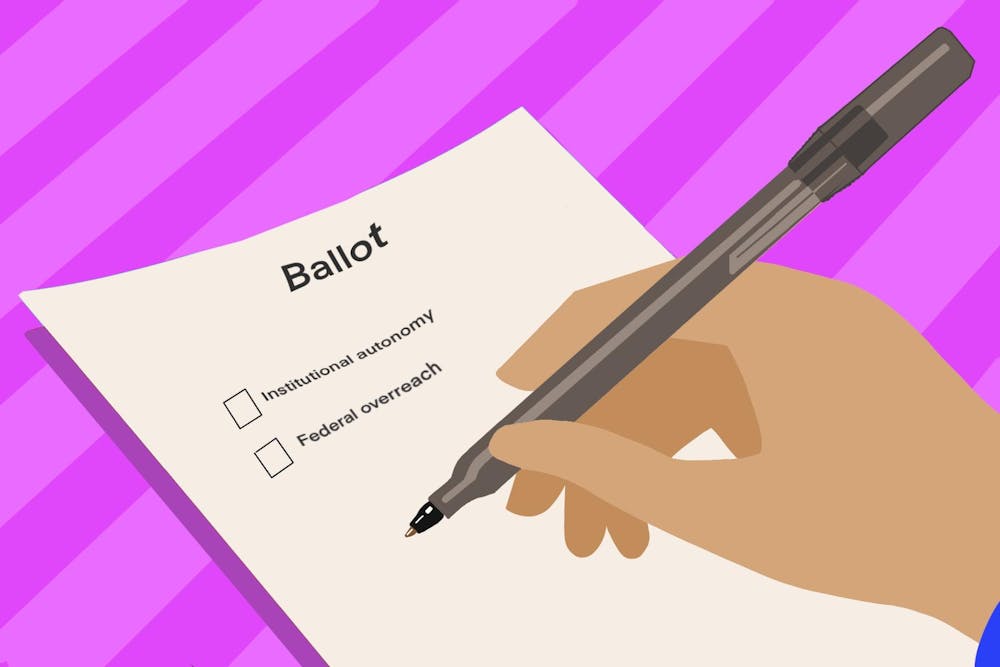This November, Virginia is presented with a watershed election. The contest is between the Democrat, former Rep. Abigail Spanberger, and the Republican, Lt. Gov. Winsome Earle-Sears, with Spanberger strongly favored among younger voters. Additionally, incumbent Jason Miyares and Jay Jones are running in the Virginia Attorney General election.
Over the past four years, this University has become more acquainted with the influential power of the governor and the attorney general than we perhaps ever wished to be. The past few months specifically have showcased how pivotal these two roles are — or rather could be — to upholding academic freedom and institutional autonomy at the University. So while this is a state-wide election with ramifications for every corner of Virginia, it is also an election whose implications will resonate deeply at state institutions of higher education. Vote accordingly.
Most crucial to this November in the context of the University are threats of federal overreach, both past and present. In June, former University President Jim Ryan resigned from his position following unprecedented federal pressure from the Department of Justice. His resignation was met with no objection from the Governor or Attorney General of the Commonwealth — two individuals who could have provided critical support for the University in a time of instability or stood up against an unprecedented moment of federal overreach. This silence is reminiscent of the smaller and more incremental decisions taken over the last four years of Gov. Glenn Youngkin and Miyares’ term, decisions which have slowly but surely politicized our University and undermined its commitment to academic freedom and excellence.
This year, we must choose a different path. First and foremost, this means choosing a governor who is invested in depoliticizing our Board of Visitors and supporting the mission of the University. Equally as important, from the perspective of our University, is the selection of an attorney general who is able and willing to defend the University when it is warranted.
The duties and expectations of the future governor in relation to institutions of higher education are quite expansive and can be intangible. However, when done incorrectly, the consequences for the University are significant, as the past four years have epitomized. As governor, Youngkin has been overreactive in times that called for distance and underreactive during crises that called for action, a dichotomy which had the effect of hyperpoliticizing norms like academic freedom and institutional autonomy.
His treatment of appointments to the Board has been particularly destabilizing for the University. Gov. Youngkin’s partisan replacements on the Board have proven themselves overzealous and disparaging, leaving the University guessing on how partisan appointments will inconsistently shift outcomes for the University’s community and policies. Responding to the Virginia Senate Democrats’ rejection of Board appointees earlier this fall, Gov. Youngkin stopped reporting appointments to the Virginia Senate — a partisan refusal to uphold gubernatorial transparency in the University’s very own governing bodies.
Spanberger, in contrast, has stood firm in her commitment to maintaining institutional autonomy in response to Ryan’s forced resignation and not allowing Virginia schools to become a “punching bag” for partisan agendas, Earle-Sears has not made strong claims on similar fronts. Spanberger publicly labeled the Compact as an “outrageous proposal” that threatened the University’s academic freedom, and Earle-Sears has not made a public statement about it. Silence in these moments is telling — transparently demonstrating the protection Spanberger could spearhead for this University, and promising little from Earle-Sears’ continuation of Youngkin’s policies.
The next governor will not defend this institution alone. As the Commonwealth’s chief legal officer, the Attorney General bears the responsibility of legally defending the institutional autonomy of public institutions like the University. All members of the University’s legal and regulatory Counsel are appointed by the Attorney General, an arrangement which is not necessarily the norm at other universities in the country. In his capacity, Miyares has been entrusted with the University’s legal defense, and yet, countless legal challenges against the University from the federal government have been met with no substantial action or commitment by Miyares himself.
To be clear, Jones is far from a perfect candidate, and recent revelations have raised concerns about his ethical fortitude to be attorney general. These concerns are understandable, as is the idea that, for some voters, Jones’ comments should take precedence over other issues.
Nevertheless, from the position of prioritizing the interests of our University, Virginia’s current Governor and Attorney General have been absent during a time of unprecedented change and turmoil for higher education. Their successors must match the needs of this institution, acknowledging the power they hold to protect the University at vulnerable moments and uphold its autonomy at others. Spanberger is the gubernatorial candidate who has shown the ability to rise to these expectations.
The external, federal challenges we face demand statewide leadership that understands and acts to protect academic autonomy and shared governance. While change will not come overnight, it begins with those we choose to represent us.
The Cavalier Daily Editorial Board is composed of the Executive Editor, the Editor-in-Chief, the two Opinion Editors, two Senior Associates and an Opinion Columnist. The board can be reached at eb@cavalierdaily.com.







